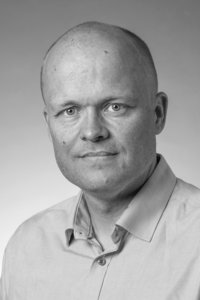Aarhus University Anniversary Foundation Prize of Honour for Pedagogics 2016
The Aarhus University Anniversary Foundation Prize of Honour for Pedagogics is awarded in recognition of outstanding and groundbreaking teaching at Aarhus University and is accompanied by a DKK 100,000 monetary award.

The 2016 Aarhus University Anniversary Foundation Prize of Honour for Pedagogics goes to Professor MSO Jeppe Bundsgaard
When Professor MSO Jeppe Bundsgaard presented the results of ICILS, the first international study of student computer and information literacy in the autumn of 2014, there was an intimate atmosphere, with participants seated at tables set with white tablecloths and candles. Intimate, but not entirely analogue, of course. The presentation took place at a conference on IT in schools which Bundsgaard had organised as an interactive event which let participants engage in dialogue with speakers both live and online.
The combination of the analogue and the digital is characteristic of Bundgsgaard’s work as an educator, whether he is teaching, advising students, designing degree programmes and courses or presenting at conferences. He has been doing research on IT in teaching for a number of years, and he has a background in computer science and has been involved in the development of a variety of games and other digital learning resources. For example, Redaktionen (‘the editors’), a digital tool designed to help a school class produce a print newspaper.
But Bundsgaard’s fascination with IT is not technology fetishism: it is not a matter of using as much IT in the classroom as possible, but rather of using it better, as well as understanding that IT is always used in a specific context, which means that it is necessary to consider how IT can produce the best learning outcomes in each different teaching situation.
A passion for dialogue
Bundsgaard is passionately interested in his field, and he is an engaging and knowledgeable lecturer and speaker who knows how to present his subject to students and conference participants in an interesting and precise way. Although Bundsgaard does not hold back on sharing his expertise, he is always first and foremost interested in encouraging discussion and dialogue. While he is happy to take the floor in a debate – including in public media, for example in relation to the debate on nation tests in the Danish school system – he consistently invites others to continue the conversation. It’s no accident that the title of his 2005 PhD dissertation was ‘A contribution to IT didactics in Danish teaching’. A contribution, not the last word in the matter.
Bundsgaard is the incarnation of the classical academic ideal of research-based teaching. His many years of research into how IT can be used in teaching form the foundation of his own teaching practice, in which IT is a tool to facilitate dialogue, interaction and involvement, not simply a clever way to present information. The focus of Bundsgaard’s research is the development of teaching methods, particularly in relation to Danish language arts: what should we teach, how and why? What challenges does IT present to teaching practice, and what possibilities does it give us? He shares his ongoing reflections on what the content of the Danish curriculum should be in a knowledge and network society with students on the Master’s degree programme in the didactics of Danish at the Danish School of Education (DPU), which is where he teaches most of his courses.
Progressive teaching with IT
In Bundsgaard’s January 2015 inaugural lecture as professor MSO in ‘subject didactics and IT’ at DPU, he referred to the ICILS survey, which showed that the level of ICT use in teaching in Denmark is at a high level compared to many other countries. However, IT is primarily used in connection with more traditional forms of teaching, in which teachers use IT to present information, and students use IT in their individual work on their assignments. As Bundsgaard says:
“Teaching can be so incredibly cool. The goal is to develop more progressive forms of teaching with IT.
In other words, investigative as well as cooperative and project-based forms of teaching, in which IT supports reflection, analysis and communication. But the results of ICILS showed us that this is the least common approach. The results give us a good impression of what challenges we face if we want to promote more progressive teaching.”
He addresses this challenge himself in his own teaching practice at DPU. Bundsgaard is not only an advocate of progressive teaching; he practices it.
In the coming year, Bundsgaard will be Visiting Scholar at the University of California, Berkeley, and he is looking forward to returning home with new ideas about how to improve teaching. Both his own and others.